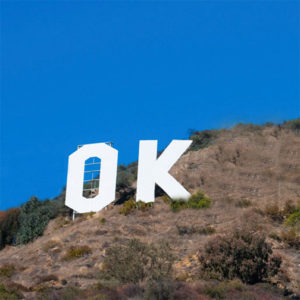The Story of OK
© 2016 Christopher DiMatteo. All Rights Reserved.
An Iconic Expression
 The term OK is probably America’s single most successful export. It is used in almost every language in the world and is perhaps the most flexible and adaptable expression ever invented in human language. We now know its true origin, but that was discovered many decades after the expression had taken over American English and then the rest of the world. Before its true origin was unveiled, there were many theories of its origin. The expression’s popularity must have nourished the imagination of the people to came up with so many different ideas of its origin, and none of them are correct.
The term OK is probably America’s single most successful export. It is used in almost every language in the world and is perhaps the most flexible and adaptable expression ever invented in human language. We now know its true origin, but that was discovered many decades after the expression had taken over American English and then the rest of the world. Before its true origin was unveiled, there were many theories of its origin. The expression’s popularity must have nourished the imagination of the people to came up with so many different ideas of its origin, and none of them are correct.
This abundance of erroneous stories about OK shows how conjecture about words and expressions can lead to theories of origin. They may sound plausible but they can still be completely wrong.
Here are some colorful examples of OK’s proposed origins. It is interesting to note how this question was first proposed by the great H.L. Mencken in his monumental work The American Language. Several decades after Mencken pointed the way for later generations of scholars to take on the subject of American speech, the story of OK was finally put together. But between the origin of the expression and the time Mencken first wrote about it, he was able to collect several stories of its origin that had sprung up and circulated around the country. Here I will take you on a little tour of the erroneous conjectures before ending up on the right one.
Several Proposed Origins of OK, All of Them Wrong
Two of the proposed origins of OK date back to the late 18th century and suggest French origins for the expression. According to one, OK is an echo of the name Aux Cayes, the name of a port in Haiti which exported rum to the American colonies. This rum was apparently the best available at the time, so its name may have been used as a term of approval.
Another story concerns General Lafayette, who came to the aid of the American colonists during the Revolutionary War, bringing hundreds of French soldiers with him. Supposedly, they often made dates with American girls “down at the docks” or “aux cayes” in French.
However plausible they sound, we now know that neither of these can be correct because they predate any record of the expression’s use.
From the 1860s, the Civil War gave us two other theories. According to one, OK came from the Orrins-Kendall company, which furnished biscuits to the Union army in boxes prominently marked “OK.” Another holds that OK meant “zero killed” on a battle report written by a military officer. I have personally heard this same story cited as the origin of OK, but in reference to World War I, not the Civil War.
A Native American language is the source of another etymological explanation. President Woodrow Wilson (whose two terms ran from 1912 to 1920) is said to have been fond of a Choctaw word meaning “indeed” or “it is so” and he would write “okeh” on his papers.
Another President, Andrew Jackson (who served 1829-1837) is associated with a more convincing version. Unlike Wilson, who was a Princeton University professor, Jackson had no formal education and his opponents thought he was barely literate. They used to say that they believed he wrote “OK” on documents as an abbreviation of “Oll Korrect.”
The Real Story and How It Was Found
Jackson’s successor, Martin Van Buren, is also involved, but his OK story is the only one that is supported by historical documentation and is now generally considered its true origin. The discovery of the documentary evidence was made by Professor Alan Walker Read of Columbia University in the mid-20th century, who read through decades of old newspapers of the 1800s, found its origin and even traced its rapid spread across the country.
Van Buren’s nickname was “Old Kinderhook,” for the name of the town in New York state where he was born. In 1839, when he ran for re-election, his supporters in the Democratic Party formed the “OK Club.” About 500 of them reportedly raided a meeting of the rival Whig Party and the attack began when they entered the room, repeating “OK” to each other, as a signal to begin breaking up the meeting. The Whigs repelled them and their candidate, William Henry Harrison, eventually won the election. Yet, as Prof. Read discovered and reported, the event was widely reported in the press all across the country, leading to its early recognition and popularity.
